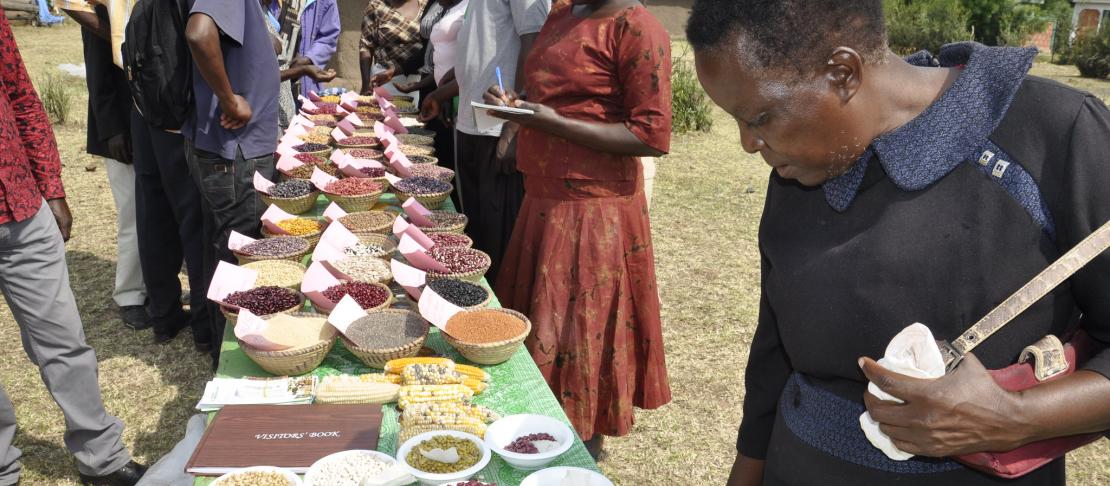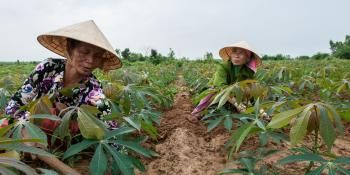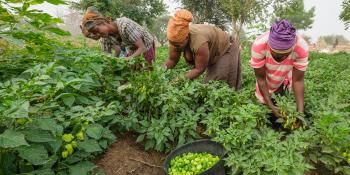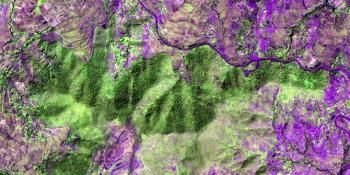Enabling access to plant genetic resources for adaptation to climate change in 8 countries

Every good thing starts from a good seed."
Dr Sylvester Baguma, Director of Research at Bulindi Zonal Agricultural Research and Development Institute
The changing climate and movement of many farm workers to cities create an additional burden for farmers around the world. This is one reason why the United Nations (UN) agreed on the International Treaty on Plant Genetic Resources for Food and Agriculture (IT PGRFA) to support food security through the exchange and sustainable use of seeds that are tailored to a region's climate. Learn more on the treaty in this video by the Food and Agriculture Organization of the UN (FAO).
In 2017, Bioversity International, the International Rice Research Institute (IRRI), the CGIAR Genebank Platform and partners supported the implementation of this treaty in 8 countries: Bhutan, Burkina Faso, Costa Rica, Côte d’Ivoire, Guatemala, Nepal, Rwanda and Uganda. These countries are now implementing the treaty, as well as the Nagoya Protocol of the Convention on Biological Diversity, in a mutually supportive manner. This means that governmental organizations in these countries have developed relevant laws and policies, and designated a national competent authority in charge of implementation.
Aside from sharing seeds, a major goal of the treaty is to share knowledge on genetic resources. Accordingly, the project also supported government organizations to identify local genetic resources that can be added to a global pool of seeds. This promotes sharing of information and seeds both within and outside of the countries.
By increasing knowledge and cooperation on plant genetic resources, the project contributed to the countries' efforts to more effectively adapt to climate change. Using suitable and more resilient crops enhances their capacity to maintain food security even under climate change, variability and uncertainty.
Further reading
- Journal article: Roles and contributions of community seed banks in climate adaptation in Nepal
- Brief: No country is self-sufficient when it comes to plant genetic resources: the cases of Bhutan, Burkina Faso, Costa Rica, Côte d’Ivoire, Guatemala, Nepal, Rwanda and Uganda
- Report: Mutually supportive implementation of the Nagoya Protocol and the Plant Treaty: Scenarios for consideration by national focal points and other interested stakeholders
- Project report: Enhancing understanding and implementation of the International Treaty on Plant Genetic Resources for Food and Agriculture in Asia (GCP/RAS/284/JPN)
- Book: Implementing the International Treaty on Plant Genetic Resources for Food and Agriculture in Nepal: Achievements and Challenges
- Journal article: The importance and challenges of crop germplasm interdependence: the case of Bhutan
Project partners
CGIAR Genebank Platform, Bioversity International, International Rice Research Institute (IRRI), FAO, Secretariat of the ITPGRFA, Secretariat of Convention on Biological Diversity, African Union Commission, ABS Capacity Strengthening Initiative,Oxfam-NOVIB, Arizona State University, National Biodiversity Centre (NBC), National Agricultural Research Centre, Kathmandu, Centre Nationale pour la Recherche Agronomique (CNRA), Institut de l’Environnement et de Recherches Agricoles (INERA), Rwanda Agriculture Board (RAB), Ministère de l'Environnement et du Développement Durable (Côte d'Ivoire) (MINSEDD), Universidad del Valle de Guatemala (UVG), Ministry of Agriculture and Forests (Bhutan), Centro Agronómico Tropical de Investigación y Enseñanza (CATIE), Wageningen University and Research (WUR), Ministry of Agriculture and Cooperatives of Nepal, Commission Nationale de Gestion des Ressources Phytogénétiques (CONAGREP), Ministerio de Agricultura, Ganadería y Alimentación (Guatemala) (MAGA), National Agricultural Research Organization (NARO), Entebbe Botanic Gardens, Ministry of Agriculture, Nature and Food Quality (Netherlands), Université de Ouagadougou, Nepal Agricultural Research Council (NARC), Ministry of Agriculture and Animal Resources (Rwanda), National Animal Genetic Resources Centre (NAGRC), Council on Renewable Natural Resources Bureau (CORRB), Local Initiatives for Biodiversity, Research and Development (LI-BIRD)


